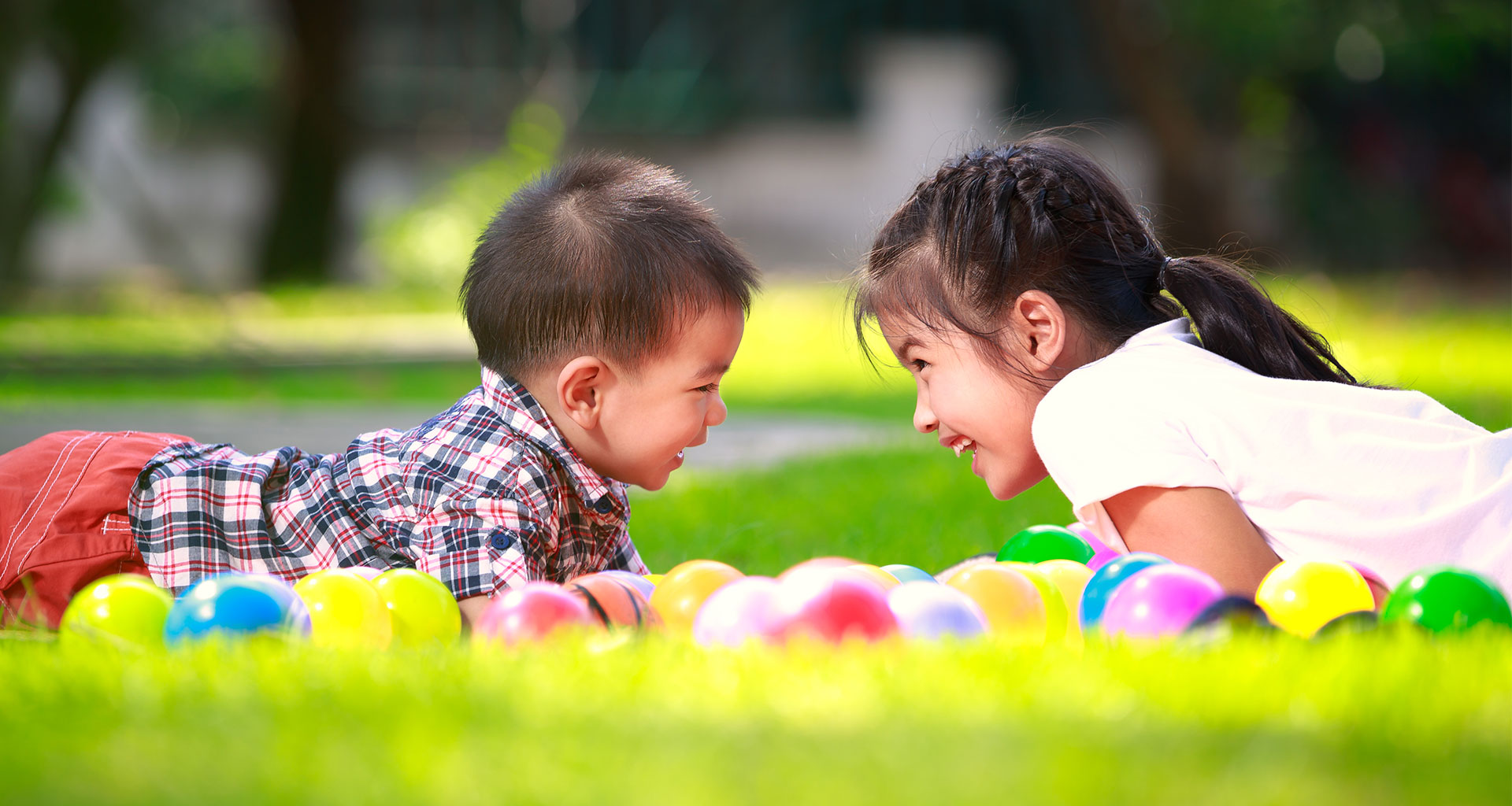
There are some children who have eight enrichment classes each week—one every day and two on Saturday. And then, there are children who are ferried from class to class—piano, ballet, Chinese tuition, and others—with hardly a breather in between.
“We call them the ‘overscheduled child’,” says Dr. Jacqueline Chung, the Academic Director of Anglican Preschool Services. “Most of their waking hours are scheduled, so they don’t play as much as they should. Even their play must be justified as having educational value!”
Overscheduling children can, ironically, affect their development, sense of identity, and confidence in life.
Having worked with children’s ministries for 25 years—she was one of the pioneers of the children’s ministry, Super PowerKids, at St. James’ Church—Jacqueline has seen the impact of busy schedules on children.
Apart from tiring children out and giving them no time to play, overscheduling children can, ironically, affect their development, sense of identity, and confidence in life.
“Young children,” she says, shaking her head, “shouldn’t be so burdened.”
Our Daily Bread for Kids Bible Activity Book
Get our latest family resource!
Our latest resource, Our Daily Bread for Kids Bible Activity Book is now available.Get a copy
Every month, we roll out a new resource for parents and children. To find out about these offers, why not subscribe to our email updates? Stay informed about the latest resources available, and be the first to get a copy!
Kids Need Sleep!
Children who are rushed from class to class don’t get enough rest. Psalm 127:2, notes Jacqueline, stresses the value of sleep: “In vain you rise early and stay up late, toiling for food to eat—for [God] grants sleep to those he loves.”
The human body, needs rest to function optimally, says Jacqueline, and young children especially need sufficient sleep. Otherwise their behaviour and ability to focus will be impaired.
“Many children are not getting enough physical rest and ‘down time’,” she says. “Sleep regenerates the body, and affects how we manage our daily activities, our responses, and our ability to focus and learn.”

Let Kids Learn to Decide
Worse still, overscheduled children are more likely to grow up with an inability to think for themselves and make their own decisions in life because they’ve had their lives planned out for them, right down to the smallest details.
“They enter life with all these schedules. Their parents have decided what they do and how they play.
That sense of ownership of their time and choices has been taken away,” says Jacqueline. “There is no more the idea of being free to do nothing, with no agenda.”
In other words, schedules can take the joy out of childhood.
When we are overscheduled, there is a downside—even as Christian families, we can end up merely going through the motions.”
This approach has even crept into the spiritual areas of family life, with children being reminded constantly to pray, do their daily devotions, and attend Sunday school.
Turning these activities into “to-do” items can also take joy out of these spiritual pursuits. “We all need routine,” acknowledges Jacqueline. “But when we are overscheduled, there is a downside—even as Christian families, we can end up merely going through the motions.”
Learn to Slow Down
Back-to-back enrichment classes and lessons can also get children used to instant gratification. Because they usually have something on all the time, kids may find it difficult to cope when there’s nothing happening, or when they have to wait for a result that takes a long time to develop.
“Don’t go from activity to activity, and don’t just go shopping. Go out into nature where you can spend quality time interacting together and enjoying the wonders of creation.”
“They’re so used to activities being scheduled all the time that they get bored easily. They unconsciously feel that it’s the duty of the adults to gainfully entertain them. They don’t know how to have downtime and to relax,” says Jacqueline.
She recommends that families spend their holidays in a slower fashion. “Don’t go from activity to activity, and don’t just go shopping,” she says. “Go out into nature where you can spend quality time interacting together and enjoying the wonders of creation.”
The Danger of “Performance”
Many parents in Singapore tend to not only pack the lives of their children with classes and lessons, but also emphasise results.
Children are expected to do well in school and in whatever they learn, even if it’s just dance or drama lessons. This, says Jacqueline, has taken the fun out of once-enjoyable pursuits.
Right from the start, parents are keen to see their children “perform” in preschool concerts.
From primary school onwards, these children are then expected to deliver results in examinations, enrichment classes, and co-curricular activities.
“We are a nation of over-achievers,” she observes.
This mother of a grown-up daughter, however, is quick to add that she is guilty of making the same mistake. Like many Singaporean parents, she says, she focused on achievements and performance, pushing her daughter to learn music because she herself was a music teacher.
“I set the bar too high. I wanted every lesson to be perfect, so unfortunately they were not enjoyable for her. In the end she never excelled at any instrument, which was probably my fault,” adds Jacqueline with a regretful smile.
What if My Child “Misses Out”?
Jacqueline acknowledges that demanding parents are usually concerned about their children’s development and fear that that their children will miss out on important life opportunities if they don’t work hard now.
However, she points out, some educators are now re-thinking the wisdom of pushing kids at so early an age.
“The concern of parents is, ‘What if they miss out?’ But my concern is, will they also miss out on their childhood?
“The concern of parents is, ‘What if they miss out?’ But my concern is, will they also miss out on their childhood? Will they miss out on the development that comes from the natural process of growing up?”
Christian parents, in particular, should also consider what the Bible says about following the ways of the world, especially when it comes to performance and being competitive.
Romans 12:2 offers a godly response: “Do not conform to the pattern of this world, but be transformed by the renewing of your mind. Then you will be able to test and approve what God’s will is—his good, pleasing and perfect will.”

Sending the Wrong Signal
The pressure to perform not only generates great stress among children—and their families, which can affect parent-child relationships—but can also give kids the wrong impression about priorities in life.
One classic example is the Primary School Leaving Examinations (PSLE), for which some parents will go to the extent of taking leave to help their children prepare.
Says Jacqueline: “It pains me to hear children say, ‘I won’t be able to come to church because I have exams—I need to study, or do my homework.’
If at such an early age they hear parents saying exams are more important than church, years down the line they’ll say, ‘I have a project due, I can’t go to church.’”
The pressure to do well may also introduce self-doubt in children.
“If at such an early age they hear parents saying exams are more important than church, years down the line they’ll say, ‘I have a project due, I can’t go to church.’”
If parents are sacrificing so much for the PSLE, notes Jacqueline, some kids may start to wonder, “What if I don’t do well? Will I disappoint my parents? Will my parents still love me?” “It is not good for children to have such a burden,” she concludes.
How parents respond to school examinations and their children’s scholastic performance, she stresses, can say a lot about the relative importance of the Word of God in their family life.
The Bible, she notes, stresses the importance of keeping the Sabbath and spending time listening to God. In Luke 10:38–42, Jesus reminds the busy Martha not to be anxious, and praises Mary for choosing “the good portion” (ESV).
Some parents, Jacqueline says, have tried to put this into practice by reminding their kids to honour God above studies.
These families continue to attend church and maintain other spiritual routines through the year, exams or no. “Many of these children have learned to be responsible and self-motivated,” she observes. “They have done reasonably well in their studies without their parents having to push them.”
Let Your Kids be Kids!
The upshot of all this, according to Jacqueline, is we should let children grow up as . . . children.
When parents do the thinking and planning for their kids, she explains, they end up over-protecting their children, who are likely to become less resilient as a result.
For example, she has seen parents intervene when children have disagreements at playtime or have a falling out with their friends in class. But she thinks that wherever possible, it is better to let the kids sort out their friendships on their own instead of trying to engineer every move.
“‘We don’t want our children to fail, to be upset. We want to set them up for success,’ some parents may say. But as a result, these children may become less resilient emotionally,” she notes.
Your Kids are God’s Gift
Ultimately, says Jacqueline, parents need to take care that their desire to be good parents does not lead them to idolise successful parenting and worldly success.
Parents need to take care that their desire to be good parents does not lead them to idolise successful parenting and worldly success.
Instead, they should remember to cherish and value their child’s uniqueness, revealed to them by God. “Our goals and expectations of our children should come from an angle of stewardship,” she says. “As Psalm 127:3 says, ‘Children are a gift from God.’”
Jacqueline’s Tips on Letting Kids be Kids
- Avoid pushing your child to develop faster. This might affect his natural development and he might miss out on some important aspects of childhood.
- Don’t let school and examinations swallow up personal and family time.
- Give your child enough rest and down time to just play and relax.
- Avoid over-protecting your child—allow him to think and decide for himself where appropriate.
- Allow your child to experience small setbacks and failures, with your support and encouragement.
For more, check out our parenting resource, Help! I’m Stressed About My Child’s Education. You can read it online or request a copy by clicking here.




